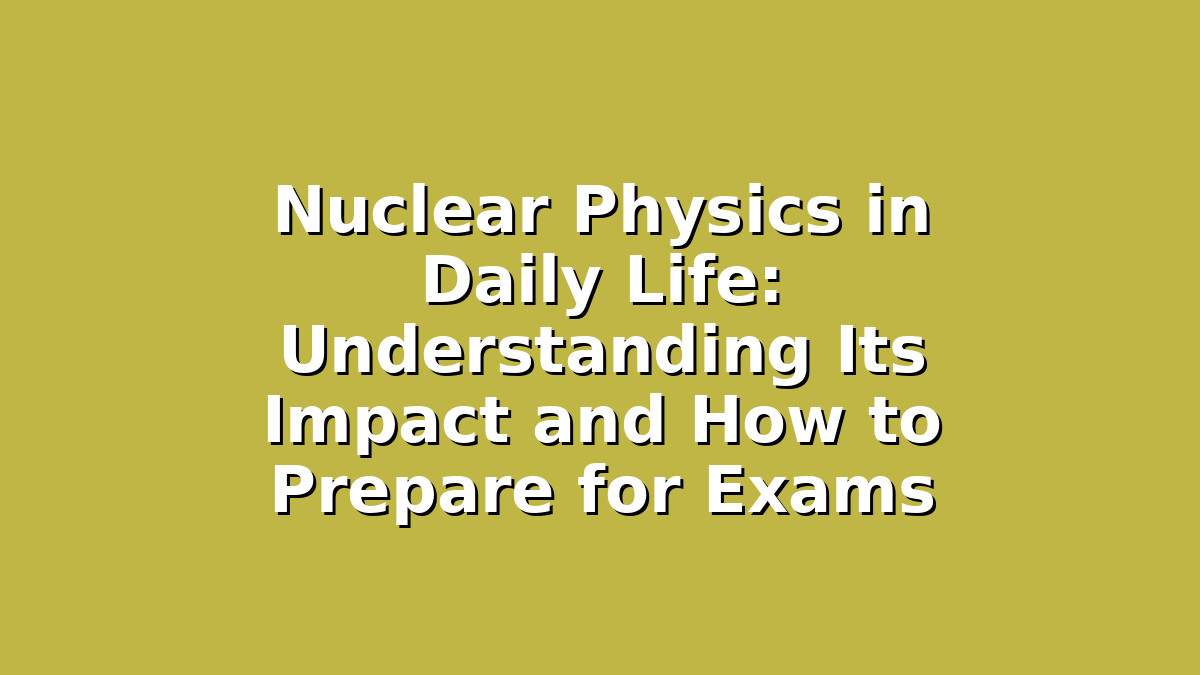Nuclear physics might sound like a complex and intimidating subject, especially for students preparing for exams. However, it plays a significant role in our everyday lives, from the energy that powers our homes to the medical technologies that save lives. Understanding nuclear physics not only helps you grasp important scientific concepts but also makes your study sessions more engaging and meaningful. In this article, we will explore the presence of nuclear physics in daily life, offer practical study tips tailored to this topic, and guide you on how to effectively prepare for exams. Let’s dive in and discover how nuclear physics connects with your world and your studies.
1. Nuclear Physics Around You: Real-Life Applications to Remember
When studying nuclear physics, it can be easy to get lost in abstract theories and complex formulas. But knowing how it applies to daily life can make the subject much more interesting and easier to understand. Here are some everyday examples where nuclear physics plays a critical role:
– Energy Production: Nuclear reactors use the process of nuclear fission to generate electricity. Unlike fossil fuels, nuclear energy produces a large amount of energy from a small amount of fuel, making it a powerful and efficient energy source. Understanding the basics of fission and how nuclear power plants operate will help you connect theory to practice.
– Medical Applications: Nuclear physics is fundamental to many diagnostic and treatment methods in medicine. Techniques such as X-rays, PET scans, and radiation therapy rely on nuclear radiation to detect or destroy cancerous cells. Knowing these applications can provide useful context for questions related to radiation and nuclear decay.
– Smoke Detectors: An everyday device many students use without thinking is the smoke detector, which often contains a small amount of radioactive material. This material helps detect smoke and alert you to potential fires, illustrating how nuclear technology improves safety.
Study Tip: To retain these examples, try creating flashcards with “Application” on one side and “Nuclear Physics Concept” on the other. Review these regularly to build a strong mental link between theory and real-world uses.
2. Mastering Key Concepts with Effective Study Strategies
Nuclear physics covers many challenging topics such as radioactivity, half-life, nuclear reactions, and radiation safety. Here’s how you can tackle these subjects systematically:
– Break Down Complex Topics: For example, when studying radioactivity, separate topics into types of radiation (alpha, beta, gamma), their properties, and their penetration abilities. Use diagrams or color codes to visualize differences clearly.
– Practice Numerical Problems: Many exam questions involve calculations, such as determining half-life or energy released in nuclear reactions. Regular practice with these problems is essential. Start with simpler calculations and gradually move on to more complex ones.
– Use Mnemonics and Analogies: Creating mnemonics or analogies can help. For instance, think of alpha particles as “heavier and less penetrating” like a bowling ball, while gamma rays are “light and highly penetrating” like a laser beam. These mental images help recall the properties quickly during exams.
– Watch Educational Videos: Sometimes, visual content can clarify concepts better than textbooks. There are many free and reliable educational videos explaining nuclear decay processes, chain reactions, and safety precautions. Visual learners will find this method especially helpful.
Study Tip: Set aside dedicated time blocks for nuclear physics in your study schedule, alternating between theory, problem-solving, and revision of real-life applications to keep your learning balanced and engaging.
3. Exam Preparation: Tips for Confidence and Success in Nuclear Physics
Preparing for exams can feel stressful, especially with a technical subject like nuclear physics. Here are some practical tips to help you stay confident and perform your best:
– Understand the Exam Format: Familiarize yourself with past exam papers and syllabus outlines. Knowing what types of questions are commonly asked (multiple choice, short answer, essay, calculations) can help tailor your revision.
– Create Summary Notes and Mind Maps: Condense your notes into key points and diagrams. Mind maps are particularly useful for nuclear physics because they can show connections between concepts such as types of decay, nuclear reactions, and their applications.
– Group Study and Discussion: Explaining nuclear physics concepts to peers or discussing tricky problems can deepen your understanding. Teaching others is a proven way to reinforce your knowledge.
– Stay Updated on Safety and Ethical Issues: Sometimes exams include questions on radiation safety or ethical considerations of nuclear technology. Keep a note of important safety protocols and debates around nuclear energy use to be prepared for these topics.
– Practice Time Management in Exams: Allocate time to each question based on marks and difficulty. If you get stuck on a problem, move on and return later. Keep calm and use logical steps to solve nuclear physics problems.
Study Tip: Before the exam, ensure you get enough rest and eat a healthy meal. A focused and refreshed mind performs better on technical subjects.
Conclusion
Nuclear physics might initially seem daunting, but understanding its role in daily life can spark your interest and provide practical context for your studies. By recognizing real-world applications, mastering key concepts through effective study techniques, and preparing strategically for exams, you can gain confidence and improve your performance in this important scientific field. Remember, persistence and curiosity are your best study partners. Keep exploring, practicing, and connecting theory with reality, and nuclear physics will no longer be just a subject in your syllabus—it will become a fascinating part of how you see the world.
Good luck with your studies, and remember: every great physicist started by mastering the basics—just like you!

Responses